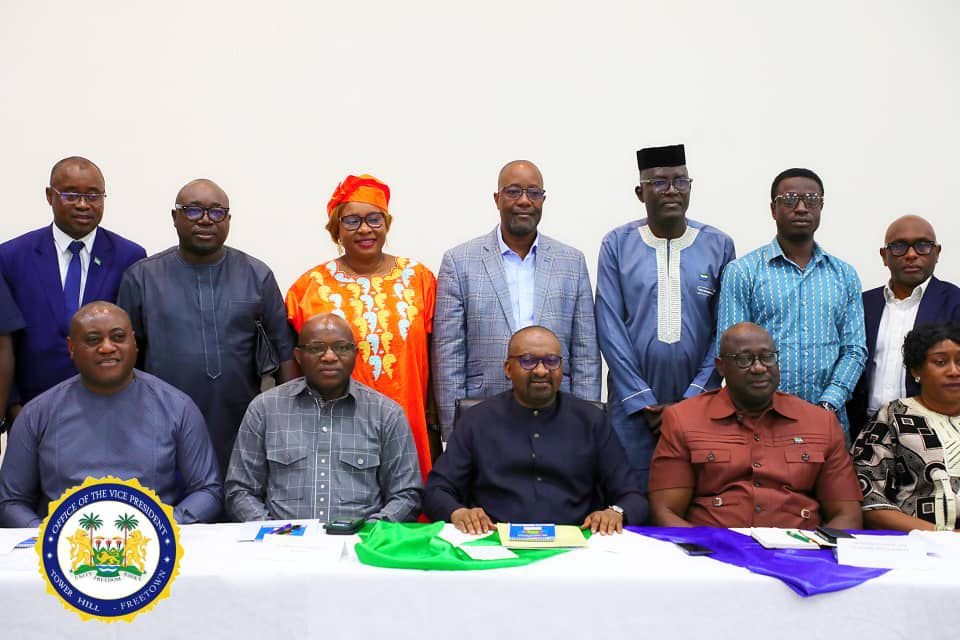
VP Juldeh Jalloh Underscores Stronger Partnership and Accountability at Maiden Government – NGO Dialogue Day
Aminata Turay
Hon Vice President Dr. Mohamed Juldeh Jalloh has reaffirmed the government’s commitment to strengthening partnerships with Non-Governmental Organizations (NGOs) during the maiden Government-NGO Dialogue Day on Thursday 9th October held at the Brookfields Hotel in Freetown. The event, themed “Strengthening Partnership and Creating the Enabling Environment for Non-Governmental Organisations,” brought together key development players to deepen coordination, promote transparency, and enhance mutual accountability between the government and the NGO sector.
Speaking at the opening, the Hon. Vice President commended NGOs for their invaluable contribution to Sierra Leone’s development across multiple sectors, including education, healthcare, agriculture, food security, gender equality, and poverty reduction. He emphasized that NGOs remain vital partners in delivering the government’s Big Five Agenda and ensuring that no one is left behind, particularly the most vulnerable. Dr. Jalloh lauded the sector’s impact in transforming lives, improving well-being, and advancing human development across the country.
Highlighting government’s ongoing efforts to foster a conducive operational environment for NGOs, Dr. Jalloh pointed to several initiatives, including the National NGO Policy 2023, which seeks to provide clarity and consistency in engagements between government and civil society actors. He also mentioned the expansion of access to information through the Nationwide Civility Series, greater public dialogue, and the opening up of the National Budget Process to partners and the media. According to him, these reforms are designed to enhance trust, coordination, and transparency in governance and service delivery.
Reiterating his personal commitment to collaboration, the Vice President maintained that his office will continue to operate an open-door policy, encouraging NGOs to engage directly with government institutions both locally and internationally. He disclosed plans to institutionalize the dialogue as an annual platform for reflection, accountability, and strategic planning. “Today’s meeting marks a huge step towards institutionalizing partnership and sharing of resources,” he stated, adding that he envisions the dialogue as a recurring event that will strengthen cooperation and ensure that government and NGOs continue working hand in hand to deliver for the people of Sierra Leone.
Development Secretary, Minstry of Planning and Economic Development MOPED, Ambrose James , in his statement Calls for Stronger Accountability and Coordination Among NGOs
Mr James underscored the need for greater compliance, coordination, and transparency within the NGO sector. He emphasized that some organizations begin implementing projects without fully satisfying program requirements or completing the signing of their Service Level Agreements (SLOs), which undermines proper accountability. He also highlighted challenges in meeting post-recruitment activity targets and stressed the need for clearer reporting standards. The Secretary urged NGOs to improve the timeliness and accuracy of their data submissions, noting that incomplete or incorrect data hinders effective monitoring of the Medium-Term National Development Plan.
Mr. James further called on NGOs to strengthen their engagement at both district and national levels by ensuring quality representation at coordination meetings. He raised concerns about poor communication practices, such as outdated contact details and inconsistent participation in local development forums. The Secretary also encouraged NGOs to prioritize sustainability from the start of projects through capacity building and community involvement. He appealed for stronger stakeholder consultations with local councils and chiefdom authorities, as well as more inclusive needs assessments that align with national priorities. In closing, he reaffirmed his ministry’s commitment to working closely with NGOs to explore new funding models and partnerships beyond traditional overseas assistance, stressing that innovation and collaboration are key to advancing Sierra Leone’s development goals.
Speaking on behalf of the NGO, INGO Forum Steering Committee Co – Chair, Davina Jeffery, commended ,MOPED and SLANGO for their continued support and collaboration with development partners. She noted, however, that the sector is currently facing significant funding challenges, with a 20–25% drop in overseas aid to Sub-Saharan Africa that has already forced several NGOs in Sierra Leone to scale down or close operations. Addressing the issue of taxation for international NGO staff, she explained that while the community is committed to complying with the PAYE regulation, it needs time to adjust existing donor agreements and staff contracts. She appealed for the waiver of payments prior to July and recommended that the tax be applied only to basic salaries to simplify compliance, given the variations in benefit structures across organizations. She also requested that the NASSIT contribution for international staff be reconsidered, since it is unlikely that those on short-term assignments would be able to reclaim their contributions upon retirement.
Turning to institutional coordination, the NGO representative called for greater clarity on the role of Parliament’s Committee and NGOs, noting that much of the data required by Parliament is already submitted through the Ministry of Planning and Economic Development (MoPED). She suggested streamlining reporting systems so that MoPED can share NGO data directly with Parliament, thereby avoiding duplication and administrative strain. Finally , She called for a unified approach that ensures fairness, transparency, and sustainability in NGO–government collaboration.
Leader of Government Business in Parliament Hon. Mathew Sahr Nyuma, emphasized the need for stronger coordination between government ministries, parliament, and non-governmental organizations.He reminded participants that parliament remains the supreme authority of government oversight and must be duly informed and involved in engagements with external partners.
Citing Section 110 of the Constitution, he underscored that all communications or collaborations involving ministries and NGOs should follow due procedure through the appropriate government channels. He called for adherence to the rules of procedure and improved accountability in engagements, stressing that any partnership must align with national priorities and parliamentary oversight.
The Leader further commended the Vice President for fostering dialogue between government and NGOs, noting that such collaboration was key to ensuring transparency, mutual respect, and progress in national development efforts.